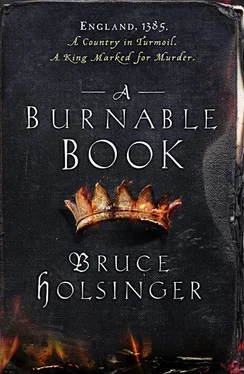Bruce Holsinger - A Burnable Book
Здесь есть возможность читать онлайн «Bruce Holsinger - A Burnable Book» — ознакомительный отрывок электронной книги совершенно бесплатно, а после прочтения отрывка купить полную версию. В некоторых случаях можно слушать аудио, скачать через торрент в формате fb2 и присутствует краткое содержание. Год выпуска: 2013, Издательство: HarperCollins Publishers, Жанр: Исторический детектив, на английском языке. Описание произведения, (предисловие) а так же отзывы посетителей доступны на портале библиотеки ЛибКат.
- Название:A Burnable Book
- Автор:
- Издательство:HarperCollins Publishers
- Жанр:
- Год:2013
- ISBN:нет данных
- Рейтинг книги:4 / 5. Голосов: 1
-
Избранное:Добавить в избранное
- Отзывы:
-
Ваша оценка:
- 80
- 1
- 2
- 3
- 4
- 5
A Burnable Book: краткое содержание, описание и аннотация
Предлагаем к чтению аннотацию, описание, краткое содержание или предисловие (зависит от того, что написал сам автор книги «A Burnable Book»). Если вы не нашли необходимую информацию о книге — напишите в комментариях, мы постараемся отыскать её.
A Burnable Book — читать онлайн ознакомительный отрывок
Ниже представлен текст книги, разбитый по страницам. Система сохранения места последней прочитанной страницы, позволяет с удобством читать онлайн бесплатно книгу «A Burnable Book», без необходимости каждый раз заново искать на чём Вы остановились. Поставьте закладку, и сможете в любой момент перейти на страницу, на которой закончили чтение.
Интервал:
Закладка:
Nothing here made sense. ‘So you lose a book in Florence, and you ask me to find it in London?’
‘Hardly,’ he said, still hesitating. ‘The book you were looking for was a copy of my own, made by … it was — it was Simon who stole my book-’
‘As I suspected.’
‘-who stole my book, copied out the De Mortibus word for word, line for line, and then-’
He stopped, a hand at his mouth as he looked sidelong at me.
‘Then what, Geoffrey?’
‘Then he added a final prophecy of his own.’
My vision blackened entirely, though only for a moment, and afterwards I felt a clarifying and melancholy sadness. Simon’s involvement explained so much, and about everything. His return to England, his eagerness to mingle with the chancellor and official Westminster, that peculiar scene with Chaucer at Windsor. It was as if a piece of gauze had been torn suddenly from my lame and weakened eyes, even as a new weight settled around my heart. I wondered if anything Simon had said to me, anything at all, were true: his longing for home, his desire for a new intimacy with his father, his need to hear of Sarah’s last days. All of it feigned?
‘Simon wrote the thirteenth prophecy,’ was all I could say.
‘Out of spite, and simple jealousy,’ said Chaucer. ‘The jilted lover, revenging himself on the man who stole his lady’s heart. One of the oldest stories there is, though in this case augmented by a reckless disregard for all the other lives affected, even the safety of the realm. With my little book in hand he would have indisputable proof that I was involved in the De Mortibus , along with a host of other information he could peddle back in Westminster.’
‘Information?’
‘That quire was dangerous, true, but not only because of the prophecies, which, you must remember, I still regarded as nothing at the time. The book, you see, had all my jottings about what I had learned of Hawkwood’s plans over my months in Italy. Troop movements, financing through bankers in Venice, plans for garrisoning and travel. While Simon was copying the prophecies he saw what was in front of him, and recognized it for what it was.’
‘So why didn’t you tell me all this earlier, Geoffrey? When we first spoke about it, or that day in the customhouse? Think of the time and trouble you might have spared me, and yourself.’
‘Well, in my defence, I was almost as ignorant as you when we met at Monksblood’s. I had suspected Simon of lifting my book but had no proof, nor even certain knowledge that he had returned to England. Then, once he showed himself, it became … personal, I suppose. I could see that you were taken with him, that the two of you were starting to reconcile after so many years.’ He stopped, closing his eyes. ‘And I have only just confirmed that Simon wrote the final prophecy.’
There was a large rose bush climbing an old trellis on the priory edge of the garden. My eyes had fixed on one stem heavy with newly opened buds, and as Chaucer pressed on I watched spots swimming in a field of cloying pink.
‘It was Simon’s peculiar mind that conjured the details that made the thing so damned convincing,’ he said, as much to himself as to me. ‘Wykeham has always had a feast on St Dunstan’s Day, and Simon used to speak with such admiration about those pearls. You would show them to him when he was young, while Mark Blythe was carving them over the gates.’
Sunday strolls along the palace walls, admiring looks up at the reliefs. I recalled my visit to Newgate so many weeks ago, the feel of the mason’s hands, rough with his labour. And of course the heraldry, the bit about the ‘pearls all appointed’, even the word spiritus from the processional, which Simon would have remembered from his years as a boy chorister.
‘He made a fair copy of the prophecies, including his new verse, but used old parchment, masking the whole thing as an ancient manuscript written in the days of King William. He also drew thistleflowers, hawks, plums, and swords along the borders, to correspond to the symbols I had written into the prophecies.’
‘From the cards,’ I said, making another connection.
‘Hawkwood had given me several decks as a gift my last time in Italy. I gave one of the decks to Swynford, simply as an amusement. But that was years ago, well before any of this. As for the verse, all that letter rhythm and so on?’ He smiled, almost bashfully. ‘I was amusing myself by writing in the rough style of other makers, like this William Langland or the poet of the green knight. Rum, ram, ruf , that dross. It was a simple thing to mimic, or misinterpret, as the case may be.’ He hesitated. ‘As was the heraldry on the cloth.’
‘Not Simon’s work, surely?’
The smile faded. ‘Seguina’s.’
‘Peculiar,’ I said, trying to make this piece fit. ‘Why would Seguina participate in Simon’s plan?’
‘The cloth had nothing to do with the prophecies, not originally. Seguina had embroidered a cloth years before with the arms of Prince Edward and the Duke of Lancaster.’
‘And Edward’s arms passed to his son, now our king.’
‘Precisely.’
‘But how on earth did Seguina come to embroider the arms of Gaunt and Prince Edward?’ The question, I would now learn, at the centre of it all.
Chaucer looked at me, his eyes lined with a sadness that, for as long as he lived, would never entirely disappear. Over the following hours, as afternoon turned to dusk and dusk to evening, I listened to the saddest story I had ever heard. A story of Castile and Aragon, of Spain and Italy, of Moors and Christians. A story of two Spanish brothers, Pedro the Cruel and Henry of Trastamara, divided against themselves in war, and of Pedro’s English allies: Prince Edward, eldest son of King Edward, and his brother, John of Gaunt, fighting on his behalf in Spain.
Yet most of all it was the story of a young woman. A daughter, a sister, a witness, a survivor, a beautiful girl who had seen her mother raped, her brother die, her noble father humiliated into the life of a mercenary. From the Castilian marches she had made her way to Lombardy and Milan, where her father hired himself and his men out to the great English condottiero . There, still a child, she learned to get by in the many languages spoken by Hawkwood’s mercenary melange: French, Italian, English, a smattering of Moorish, even Hebrew, all added to her native Castilian tongue. As she grew into a young woman, she learned to defend herself with fist, tooth, and knife, though she was saved from a life of savagery by her stepmother, a London gentlewoman living among the small English communities in Milan, then Florence. A skilful embroideress, her stepmother taught her this and other arts of womanhood: how to dress and care for her body, how to gesture and stand, how to feign interest in the conversation of men. She might be a lady herself someday, her stepmother told her, and it’s best to be prepared. Yet through it all Seguina d’Orange never forgot the scene of her mother’s violation, nor the English duke who had saved both their lives.
From the oratory came the distant drone of the office, the voices of the Austin canons carrying through the churchyard.
‘Prince Edward, then,’ I said into the cooling night. ‘Edward was-’
‘Her mother’s ravisher. Picture our good Prince Edward, heir to the English throne, abiding with Lancaster in Castile, waiting for Pedro the Cruel to pay his war debts. He never did. So Edward took it upon himself to extract them from the countryside and its people on his way back to Aquitaine. He was already falling ill, you know, and there were hints of concern about his mind. He’d learned his tactics from Pedro, and from his own long experience in the wars. He taught his men in turn to burn and rape their way through the land. He took what he wanted.’
Читать дальшеИнтервал:
Закладка:
Похожие книги на «A Burnable Book»
Представляем Вашему вниманию похожие книги на «A Burnable Book» списком для выбора. Мы отобрали схожую по названию и смыслу литературу в надежде предоставить читателям больше вариантов отыскать новые, интересные, ещё непрочитанные произведения.
Обсуждение, отзывы о книге «A Burnable Book» и просто собственные мнения читателей. Оставьте ваши комментарии, напишите, что Вы думаете о произведении, его смысле или главных героях. Укажите что конкретно понравилось, а что нет, и почему Вы так считаете.












